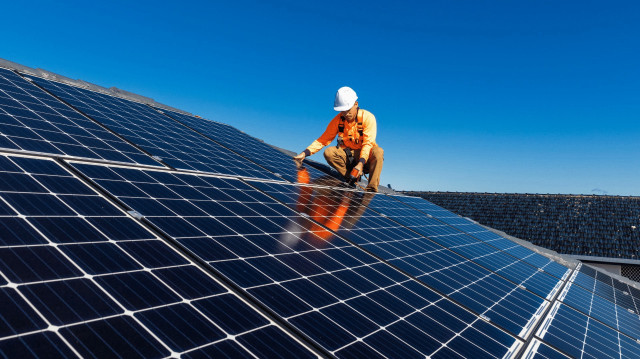
Solar remained the EU's fastest growing power source in 2024 while wind power remained the EU's second largest power source, above gas and below nuclear, according to study
Solar power generated 11% of electricity across the EU in 2024 overtook coal for the first time, a newly published report revealed Thursday.
The EU made significant progress in its electricity mix as Europe made more electricity from solar than coal in 2024, showed European Electricity Review 2025 data by an energy think tank, Ember.
Share of solar in EU electricity was recorded higher than coal which stand only at 10%, EU fossil gas power also fell for the fifth year in a row.
The study which is the ninth annual report on the EU power sector published by the UK-based group showed that €69 billion ($71.7 billion) avoided fossil fuel import costs due to new wind and solar since 2019.
It noted that the transition of the EU electricity sector maintained momentum in 2024, despite challenging political and economic conditions.
"Another year of coal and gas decline," said the report, mentioning that it cut EU power sector emissions to below half their 2007 peak and further reduced reliance on imported fossil fuels
"Significant progress has been made over the last EU political cycle, but delivery needs to be accelerated," researchers noted.
Meanwhile, driven by expanding wind and solar power, renewable energy have risen from a share of 34% in 2019 to 47% in 2024, as the fossil share declined from 39% to a historic low of 29%.
It added that solar remained the EU's fastest growing power source in 2024 while wind power remained the EU's second largest power source, above gas and below nuclear.
However, the report warned that an acceleration is needed between now and 2030, suggesting that the EU has "much to gain" from accelerating its electricity transition from a clean, electrified future to powered by wind and solar.
Accelerating green transition in electricity will also enhance energy security and bring down energy costs for all consumers across the bloc, it added.
"Fossil fuels are losing their grip on EU energy," said Chris Rosslowe, senior energy analyst, Ember, mentioning that at the start of the European Green Deal in 2019, few thought the EU's energy transition could be where it is today.
"While the EU's electricity transition has moved faster than anyone expected in the last five years, further progress cannot be taken for granted," he noted.
Rosslowe added: "The achievements of the past five years should instill confidence that, with continued drive and commitment, challenges can be overcome and a more secure energy future be achieved.”

